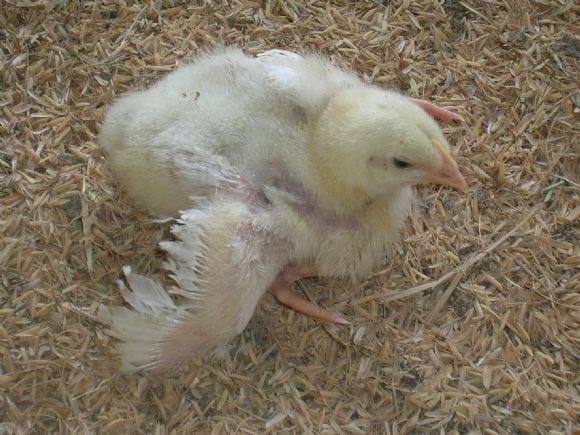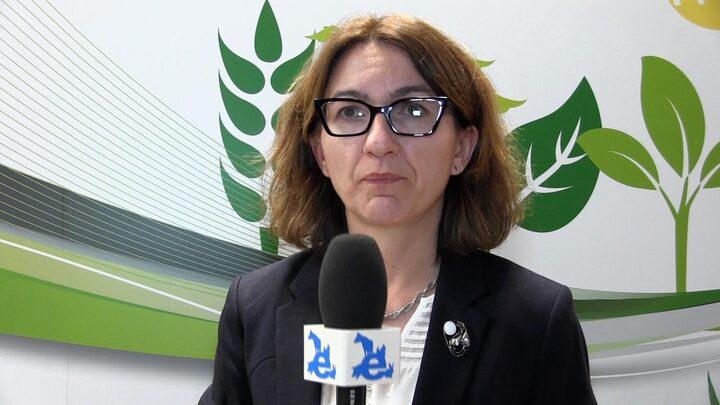Explore all the information on
Metabolic and nutritional diseases in poultry
Deficiencies or disturbances of nutrition cause a variety of diseases and can arise in different ways. The amount of a particular nutrient in the diet may be insufficient to meet the requirements, the diet may contain substances that inactivate the nutrient or inhibit its absorption/utilisation, or metabolism may be upset by the interaction of dietary and environmental factors. Peroxidation of lipids or oxygen free radical generation in general is a physiological process important for cell metabolism, division and differentiation and also for the biosynthesis of hormones and prostaglandins. Several common health conditions can affect poultry, including visceral gout, fatty liver syndrome, cloacal prolapse, osteomalacia, vitamin E deficiency, and ascites syndrome. Understanding these conditions and implementing appropriate management strategies can help prevent and treat them effectively.
This chick have leg problem. Someone would like to tell me the reason and preventions? ...
Comments : 0
Recommendations: 0
Osteoporosis (Caged Layer Fatigue) is a condition which manifests itself in several clinical signs. There is leg weakness and sometime paralysis. Affected birds are unable to stand and usually to move to the back area of the cage. They often fall onto their sides with leg outstretched. Birds which live for several days after going down may dehydrated or emaciate and are out of production. Although affected birds initially are alert and can continue to eat,...
Comments : 2
Recommendations: 3


Phytogenics are here to stay: Natural, Sustainable and Effective
Suggested link
We have broilers at 3050 mts in the Caucasus and we’ve done a detailed study about chicken breeding in altitude, which presented us alternatives (we’ve reached mortality percentages of 5.3) We want to get acquainted with experiences in the use of selenium doses (not from fish but from alfalfa) to replace phosphorus in cysteine, metionine and lysine, to give a true value to the protein. We also need information related to the provision of vitamin K in these broilers to...
Comments : 15
Recommendations: 0
Achieving maximum health and performance of poultry requires nutritionally balanced diets. One of the common issues with regard to back yard flocks relates to poor or inadequate feeding programs that can lead to vitamin and mineral deficiencies for the birds. Vitamins and minerals are very important components of a chickens diet and unless a formulated ration is feed, it is likely that deficiencies will occur. Poultry require all known vitamins except C. Some vitamins are soluble in...
Comments : 20
Recommendations: 1
In past years, several laying hen flocks in Manitoba have had mortality due to Hemorrhagic Fatty Liver Syndrome (HFLS). In a hen with this condition, damage occurs due to the buildup and oxidation of fat in the liver. The hen dies suddenly from internal bleeding when a damaged blood vessel in the liver ruptures. Clotted blood is often found in the body cavity. HFLS should be suspected if many of the dead birds in a flock are overweight and have pale combs. The dead birds should be examined...
Comments : 4
Recommendations: 0
Osteoporosis, cage layer fatigue and poor shell quality have a common cause, i.e., insufficient available calcium for the support of bone metabolism or egg shell deposition. Osteoporosis is a condition in which the structural components of bones become abnormally thin. Osteoporosis can result in excessive bone breakage when spent cage layer flocks are caught and processed. Hens with cage layer fatigue have trouble standing and typically crouch or lie at the back of the cage. Severely affected...
Comments : 0
Recommendations: 0
The microbial agents causing a number of intestinal diseases in young broilers have not yet been identified and such conditions are often called “viral enteritis” (Anonymous, 2008). However, agents causing similar signs in young birds have been reported around the world and have been called runting stunting syndrome (RSS), malabsorption syndrome, brittle bone disease, infectious proventriculitis, helicopter disease and pale bird syndrome (Rebel et al., 2006). Runting-stunting syndrome...
Comments : 6
Recommendations: 0
A global shortage of feed phosphate has forced producers to review dietary levels. But care is needed when making changes, as Aviagen's Anthony Waller explains. Suppliers of feed phosphates announced around Christmas 2007 that supplies of phosphates would be insufficient to meet orders from the animal feed industry. In some cases only 30% of ordered tonnage was supplied. This had a serious impact upon poultry feed manufacturers and producers, in terms of ability to supply stock...
Comments : 1
Recommendations: 0















